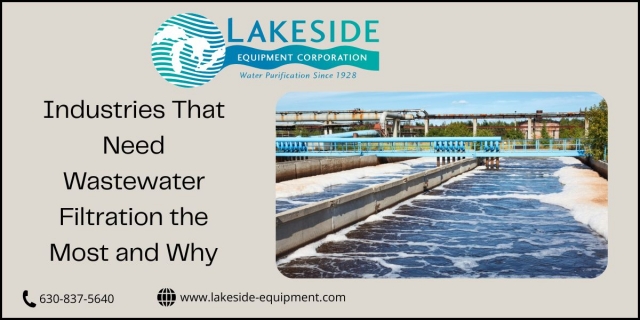With the rise of pollution and depletion of naturally abundant resources like water, more and more people and industries are making the switch to greener solutions and alternatives before it is too late. Thus, with the rise of the green movement, large-scale industries are now adopting water treatment solutions such as wastewater filtration before discharging the water back into its source.
This is exactly what we will be covering here by understanding the industries that need water management the most, and how they can set up an actionable strategy for doing so, along with the widespread benefits it brings for the planet.
What is Wastewater Filtration?
The process of wastewater filtration uses physical and biological filters to eliminate solid and dissolved contaminating agents and pollutants from water discharged by industries. This expelled water if mixed with clean sources, makes the whole water toxic and massively unfit for direct use.
The process of filtering wastewater involves a multi-step process that revolves around filtering out the contaminants in multiple stages using centrifugal pumps, media and membrane filters in the following manner:
1. Screening
The process begins with removing the heaviest and largest in size pollutants that can also settle down easily such as debris, sand, plastics, and other solid waste.
2. Primary Treatment
This step involves leaving the water standing so organic solids and sediments can settle and be collected and removed in the form of sludge.
3. Biological Filtration
This step occurs on a microscopic level where microorganisms are introduced into the contaminated water to break down and dissolve organic waste and rid the water from it.
4. Tertiary Filtration
This is the final step in the filtration process, which involves the use of advanced technologies to eliminate any remaining and harm-inducing nutrients, enzymes, particles, or microorganisms.
Which Industries Need Water Treatment the Most and Why?
The most water-intensive industries that need to treat water before discharge are those that use the most freshwater, or those that release the most polluted and contaminated water. They are primarily involved in the production, manufacturing and processing of raw materials, and are as follows:
1. Chemical and Pharmaceutical Manufacturing
This industry has just to undergo stringent water filtration because the wastewater that they produce is the worst and most toxic as they contain harmful organic and inorganic chemicals, heavy metals and active pharmaceutical agents.
2. Pulp and Paper Mills
It is the most water intensive industry that produces wastewater that is highly contaminated with organic matter and chemicals and substances such as bleach, wood fibers and high concentration of biochemical oxygen demand (BOD)
3. Food, Beverage, Oil and Gas Industries
The wastewater generated by these industries is a mixture of diverse wastewater streams of activities such as refining. Salts, oils, toxic metals, naturally-occurring radioactive material, fats and grease and others are the main contaminants of this discarded water and hence it cannot be used.
4. Electronics and Textile Manufacturing
The production of cloth and textile consists of heavy dyes, colorants, complicated chemicals among others, which must be decomposed through appropriate treatment. With regard to the electronic manufacturing industry, it is highly common to have the mixing of heavy metals, solvents and other toxic chemicals and therefore there is the need to treat the water prior to discharge.
Why Is Water Treatment Important For a Greener Earth?
After understanding the wide adoption of filtering and treating wastewater, some might ask, “how water treatment solutions are keeping the planet greener?” or “what makes the process so imperative?” The reasons this process is so crucial involves around making the water fit for reuse and sustaining aquatic and microbial life forms are the two primary reasons among these:
1. Prevents Eutrophication
Unnecessary nutrients such as phosphorus and nitrogen cause depletion of oxygen that exists in the water which is required to support aquatic life.
2. Safe Groundwater
When untreated water is discouraged into flowing streams or ground, the contaminating agents find their ways into clean and usable water, which can be easily avoided with water treatment.
3. Conservation of Natural Water Levels
By maximising the reuse of water after purification, we can reduce the amount of water drawn from fresh and active resources. Thus, turning out to be a step towards protecting the natural water resources and not solely relying on them for consumption.
4. Biogas Production as a Source of Energy
During anaerobic treatment of water, organic matter is broken down resulting in biogas, which is a renewable source of energy. Biogas is vastly used to generate electricity and lower our overall dependence on fossil fuels alone.
Industrial Grade Water Filtration For a Greener Tomorrow
We don't need any guides to understand the value of water, but to understand the value of pure and uncontaminated water, we can use some external help. With more and more activists taking initiatives to reduce the amount of water wastage and pollution, it is our job as industries to contribute towards a greener and safer planet for tomorrow. When we take the water filtration system as one step by itself to minimize water wastage, then we can spare hundreds of gallons of water as too poisonous to be utilized. Therefore, we can plant the seeds of a better planet to come, as well as today help to make our society more sustainable by making the right moves.






